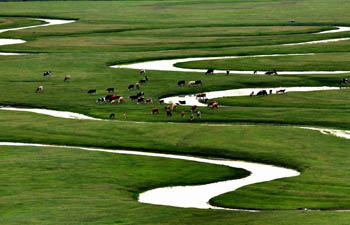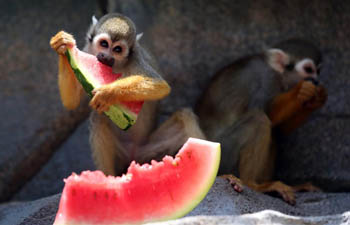SYDNEY, July 17 (Xinhua) -- With the growing Asian middle class, Australia is in the box seat to take advantage of the many emerging export opportunities, Food Innovation Australia Ltd (FIAL) Chairman Peter Schutz said Monday, in a national agribusiness report obtained by Xinhua.
The Commonwealth Scientific and Industrial Research Organisation's (CSIRO) Food and Agribusiness Roadmap, was penned as a way to identify key growth areas for Australia's food exports.
The document in collaboration with FIAL, names climate change, geopolitical instability and technological advances among the primary challenges facing Australian agribusinesses in the coming decades and warns that previous successes cannot be sustained through productivity improvements alone.
"To survive and grow, the challenge facing Australia's 177,000 businesses in the food and agribusiness sector is to identify new products, services and business models that arise from the emerging needs of tomorrow's global customers," deputy director of CSIRO Agriculture and Food, Martin Cole said.
"This Roadmap will set us on the path to sustainable growth in the sector."
Researchers identified five key areas that the industry needs to focus on, the first of these is traceability and provenance.
Food fraud is estimated to cost around 40 billion U.S. dollars per year worldwide and breakthroughs in tracking RFID chips, barcodes and QR codes in food labels is predicted to be a major windfall for innovators that can address the industry's concerns.
"Advances are already being made through the use of blockchain technology and the development of labels that change colour with temperature or time, or are programmed to release preservatives," Cole said.
Food Safety such as biosecurity was also regarded as a significant sector that Australia could lead the world in.
But to do that, the roadmap suggests Australia's agribusinesses must develop greater market intelligence and access, especially in Asia.
"Consumers are looking for differentiated products that cater to their needs," Schutz said.
"This is especially exciting for Australian food and agribusinesses, which have the capability to respond with customised and niche products."
The fourth recommendation of the report is to continue to grow skills when it comes to training, both on-the job and across digital platforms.
Finally, an emphasis was put on Collaboration and knowledge-sharing with other nations and sectors, as a way to drive change and development.
"Australian businesses are among the most innovative in the world, and together with our world-class scientists, can deliver growth in the food and agribusiness sector amid unprecedented global change," Cole said.
















